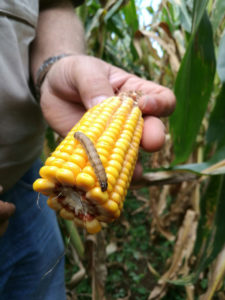by David Brewin
The armyworm returns in another form
The much-feared armyworm caterpillars have returned in another form to parts of Africa including Tanzania. These armyworms are called “fall armyworm”, and they began emerging in early 2017 throughout East Africa and beyond. During recent months, the governments of Kenya, Uganda and Tanzania have allocated more than $7.85 million for the purchase of specialised chemicals to fight them as they could wipe out large areas particularly of maize and sugarcane.
The fall armyworm is not easily noticeable in its early stages as it attacks from the heart of the maize or sugar plant. It burrows into the stalks of maize like a borer and once the worms turn into moths they can lay more than 2000 eggs in different places with a lifespan of 30 days spreading fast and in huge numbers.
The Permanent Secretary in the Tanzanian Ministry of Agriculture, Livestock and Fisheries Mathew Mtigumwe has been quoted in the press as saying that the government is aware of the presence of the new species and has put into action various initiatives to control the situation particularly in the Katavi, Mbeya and Songwe areas. Rungwe Region has been attacked from neighbouring Zambia.
The fall armyworm appears to be new in Africa and it attacks maize at all stages. Control is difficult because of the cost and scarcity of specialised pesticides as the crops are resistant to the conventional chemicals formerly used against armyworm.
Expansion of irrigation
Tanzania is said to be still well below achieving its target of 1 million hectares of irrigated land, as efforts to boost irrigation in Tanzania continue but the industry faces many problems. These include ongoing low productivity, rising food prices, and growing concerns that climate change will impact on Africa’s already unpredictable weather.
The total area of irrigated land in Tanzania is expected to double between 2004 and 2040 which promises big increases in food security. Crop yields are estimated to be 2 to 4 times higher on irrigated land than on non-irrigated land.
Tanzania may actually be much closer than expected to its national target of 1 million hectares of land irrigated, but the figures are difficult to confirm because official statistics often do not include irrigation schemes set up and run by individual small farmers. Further research is needed.
Cashew nut smuggling
Prime Minister Kassim Majaliwa has warned that traders and farmers in Lindi Region must stop selling cashew nuts to “racketeers”, and told them that they must use the official authorised marketing channels which will also provide better prices. Some traders have been buying the nuts at TSh 1,000 per kilo but the real price is expected to rise to TSh 3,500 this year.

